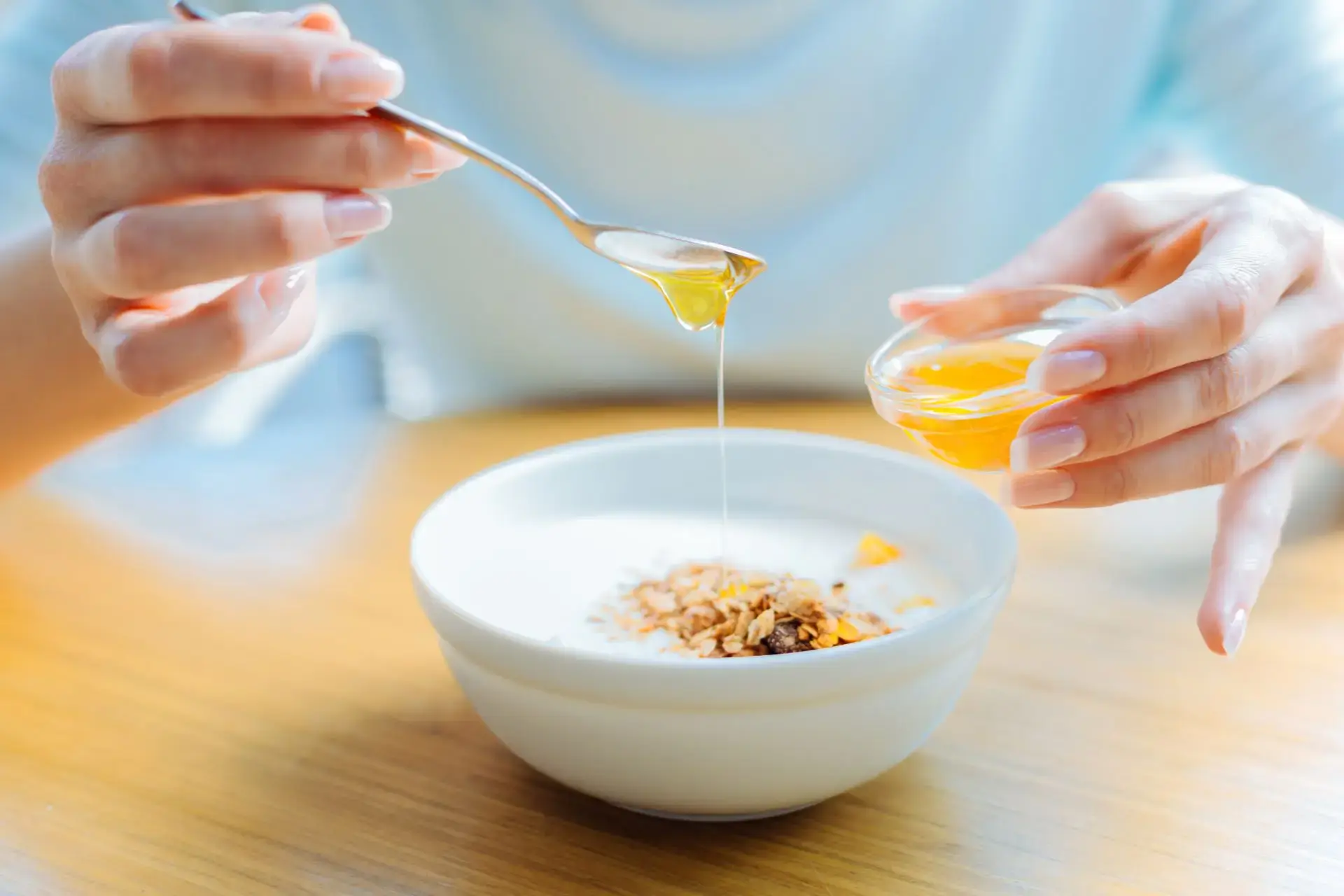Honey has been known for its valuable properties for centuries. It was used not only as a sweetener but also as a natural medicine and cosmetic. Its unique health properties are appreciated both in traditional medicine and by modern scientific research. In this article, we will take a closer look at how various types of honey can have a beneficial effect on our health.

Honey has been known for its valuable properties for centuries. It was used not only as a sweetener but also as a natural medicine and cosmetic. Its unique health properties are appreciated both in traditional medicine and by modern scientific research. In this article, we will take a closer look at how various types of honey can have a beneficial effect on our health.
Health properties of honey
Honey, this natural health elixir, is a treasure trove of many key ingredients that make it not only delicious but also extremely beneficial for our bodies. Its rich composition includes antioxidants, enzymes, vitamins, and minerals that improve our health and well-being.
One of the most significant properties of honey is its powerful antibacterial and antiseptic properties. Honey effectively inhibits the growth of bacteria, which makes it an excellent aid in the treatment of infections and wound healing. Honey also contains glucose and fructose, providing us with a quick energy boost.
Honey’s anti-inflammatory properties are another benefit that helps reduce inflammation, both internal and external. This is especially helpful in the case of diseases such as throat infections or stomach problems.
Antioxidants found in honey, including flavonoids and phenols, play a key role in protecting the body against free radicals and oxidative stress, which translates into a reduced risk of developing chronic diseases such as heart disease and cancer. Additionally, regular consumption of honey can support the immune system, helping the body fight infections and diseases.
Honey is also valued for its prebiotic properties, which means it supports the growth and activity of beneficial bacteria in the gut, contributing to digestive health and overall immunity.
The benefits of honey and modern medicine
Modern medicine is increasingly willing to use honey, appreciating its rich healing properties and support in conventional therapies. This natural beekeeping product not only complements traditional treatment methods but in some cases can be a valuable complement to them, offering less invasive and more natural solutions.
One of the most famous implementations of honey in medicine is its use in the treatment of wounds and burns. Thanks to its antibacterial, antiseptic, and skin regeneration properties, honey can accelerate the healing process of wounds, reduce the risk of infection, and improve the appearance of scars. Manuka honey in particular, from New Zealand, has gained recognition in the medical community due to its exceptionally strong antibacterial properties.
In gastroenterology, honey is used to relieve digestive system problems such as heartburn and stomach ulcers. Its anti-inflammatory and protective properties may help protect the gastric mucosa, supporting healing processes. Additionally, honey’s prebiotic effects support healthy intestinal microflora, which is crucial for overall health and immunity.
In the field of dermatology, honey is used as a natural moisturizing and skin-regenerating agent. Its antioxidant properties help fight skin aging, and its antibacterial properties help treat acne and other skin inflammations.
Honey is also being studied for its potential to reduce allergic symptoms. Research suggests that consuming local honey, which contains pollen from the area where the allergy sufferer lives, can help build immunity to these allergens.
However, it is worth remembering that despite its many health benefits, honey is not a medicine and should not be used as a substitute for medical recommendations. If you have a serious or chronic condition, always consult your doctor. Some people may also experience allergies to honey or its ingredients, which is another reason to exercise caution and consult the use of honey for medicinal purposes with a professional.
Types of honey and their specific properties
The variety of honey in the world is huge, depending mainly on the type of honey plants from which bees collect nectar. Each type of honey has a unique taste, color, and health properties, which means that its selection can be tailored to individual needs and preferences. Below are some popular types of honey and their specific properties:
Acacia honey
It is light, almost transparent, and has a delicate flavor. Thanks to the high fructose content, it remains liquid for a long time. Acacia honey is valued for its soothing properties on the digestive system and is recommended for people with digestive problems and diabetics, as it raises blood sugar levels more slowly.
Manuka honey
It comes from New Zealand, where the Manuka bush grows. It is known for its exceptionally strong antibacterial properties, superior to other types of honey, thanks to its high concentration of methylglyoxal. Manuka honey is widely used to treat wounds, infections, and skin problems.
Buckwheat honey
It is characterized by a dark color and a strong, specific taste. It is rich in antioxidants, which gives it strong anti-inflammatory and heart-supporting properties. Buckwheat honey is recommended for people looking for a natural way to improve their cardiovascular health.
Linden honey
It has a light yellow color and an intense, slightly menthol flavor. Known for its antipyretic and calming properties, linden honey is often used for colds and upper respiratory infections.
Multifloral honey
It is produced from the nectar of many different flowers, which means that its taste, color, and properties may vary depending on the region and season. Thanks to this diversity, multifloral honey is versatile in its use, supporting overall health and well-being.
Goldenrod honey
It is characterized by a light golden color and intense aroma. It is known for its properties supporting the digestive system and relieving liver problems. Goldenrod honey may also have a beneficial effect on the circulatory system.
Honeydew honey
This type of honey is obtained from the secretion of aphids or coniferous honeydew. It is thick, dark in color, and has a distinctive taste. Honeydew honey has a high mineral content and has a strong antiseptic effect.
It’s crucial to remember that raw, unpasteurized honey retains the finest properties, preserving its valuable nutrients. When selecting honey, it’s worth considering its origin and quality to fully reap its health benefits.
What to eat with honey?
Honey, thanks to its versatility and unique taste, can be a perfect addition to various dishes and drinks, offering not only sweetness but also enriching their nutritional value. It goes perfectly with morning meals, such as oatmeal, natural yogurt, or a smoothie, adding natural sweetness and supporting digestion thanks to its prebiotic properties. Honey can also be used as a healthier sugar substitute in baking, adding delicate moisture and depth of flavor to cakes and bread. In Asian cuisine, honey is often an ingredient of marinades and sauces for meat and vegetables, adding a sweet and sour flavor to dishes. Honey perfectly sweetens tea or homemade lemonade, while also soothing a sore throat and having antibacterial properties. Honey can also be spread on toasted whole grain bread, combined with peanut butter or fresh fruit, creating a nutritious and quick breakfast or snack.
How much honey should I eat each day?
The recommended amount of honey you can consume each day depends on several factors, including your overall dietary sugar intake, health condition, and nutritional goals. Generally, for most healthy adults, moderate honey consumption – is about 1-2 tablespoons (about 20-40 grams) per day – it is considered safe and can provide health benefits without the risk of negative effects such as high blood sugar levels or weight gain. It is important to remember that honey is still a form of sugar, so its consumption should be balanced with other sources of sugar in the diet and adjusted to individual health needs, especially for people with diabetes or those who are controlling their weight. Consultation with a dietitian can help determine the optimal amount of honey adapted to your nutritional plan.
The calories in honey
Honey, despite its numerous health benefits, is also relatively high in calories. One tablespoon of honey (about 21 grams) contains on average about 64 calories, which is comparable to the same amount of white sugar. However, it is worth remembering that honey, unlike sugar, contains additional nutrients such as antioxidants, vitamins, and minerals, which make it a better choice in terms of nutritional value.
The sweet truth about honey – Potential drawbacks to consider
For healthy adults, moderate amounts of honey can provide many health benefits, but it is always worth remembering the potential risks and adapting its consumption to individual needs and health issues. As with any aspect of diet, balance and moderation are key.
- Effect on blood sugar levels: Although honey is a natural source of sugar, excessive consumption can lead to increased blood sugar levels, which is especially important for people with diabetes or insulin resistance.
- Calories: Honey is high in calories and excessive consumption may contribute to weight gain, which is important for people who care about their figure or have weight problems.
- Risk of tooth decay: Like other sweets, honey can contribute to the development of tooth decay, especially if oral hygiene is neglected.
- Infant botulism: Honey should not be given to children under one year of age due to the risk of infant botulism, a rare but serious disease caused by the Clostridium botulinum bacteria that may be present in honey.
How to store honey?
Storing honey in appropriate conditions is crucial to preserve its nutritional value, taste, and health properties for a long time. Honey is a natural product that, thanks to its unique composition, can be stored for many years without losing quality. However, to ensure optimal storage conditions, you should follow a few simple rules:
First of all, honey should be stored in a tightly closed container to avoid absorption of moisture from the air. Moisture can lead to honey fermentation. Glass jars with screw caps are the most suitable because they do not react with honey and are easy to keep clean.
The optimal place to store honey is a cool, dark and dry place, away from direct sunlight and heat sources. The ideal temperature for honey is 10 to 20 degrees Celsius. Extreme temperatures, both high and low, can affect the consistency of honey, causing it to crystallize or ferment. However, it is worth remembering that honey crystallization is a natural process and does not negatively affect its quality – crystallized honey can be easily restored to a liquid form by gentle heating in a water bath.
You should also avoid storing honey in metal containers, which can corrode or react with honey, changing its taste and properties. Likewise, it is not recommended to store honey in a refrigerator because low temperatures accelerate crystallization.






Share